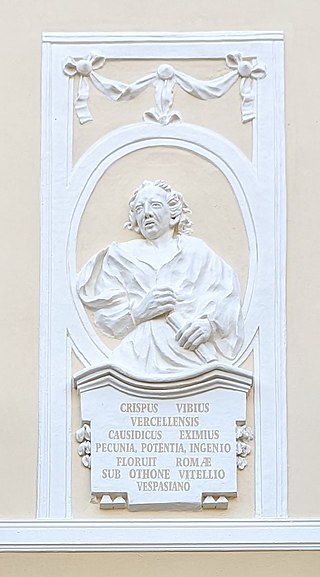Aulus Didius Gallus Fabricius Veiento was a Roman senator who played a major role in the courts of several Roman emperors during the first century AD. For his usefulness,Veiento was rewarded with the office of suffect consul three times in a period when three consulates were very rare for non-members of the Imperial family.
Marcus Vettius Bolanus was a Roman senator and soldier. He was suffect consul for the nundinium of September-December 66 as the colleague of Marcus Arruntius Aquila.
Publius Pomponius Secundus was a distinguished statesman and poet in the reigns of Tiberius,Caligula,and Claudius. He was suffect consul for the nundinium of January to June 44,succeeding the ordinary consul Gaius Sallustius Crispus Passienus and as the colleague of the other ordinary consul,Titus Statilius Taurus. Publius was on intimate terms with the elder Pliny,who wrote a biography of him,now lost.
Gaius Julius Cornutus Tertullus was a Roman senator who was active during the late 1st and early 2nd centuries. He is best known as the older friend of Pliny the Younger,with whom Cornutus was suffect consul for the nundinium of September to October 100.

Lucius Junius Quintus Vibius Crispus was a Roman senator and amicus or companion of the Emperors,known for his wit. He was a three-time suffect consul.
Titus Clodius Eprius Marcellus was a Roman senator,twice consul,best known for his prosecution of the Stoic senator Thrasea Paetus and his bitter quarrel with Helvidius Priscus. Eprius was also notorious for his ability to ingratiate himself with the reigning Emperors –especially Nero and Vespasian –and his hostility to any senatorial opposition,but in the last year of Vespasian,in circumstances that remain obscure,he was accused of treason and committed suicide.
The gens Caecinia was a plebeian family of Etruscan origin at ancient Rome. Members of this gens are first mentioned in the time of Cicero,and they remained prominent through the first century of the Empire,before fading into obscurity in the time of the Flavian emperors. A family of this name rose to prominence once more at the beginning of the fifth century.
Sextus Vettulenus Cerialis was a Roman senator and military commander,the 1st legate of Judaea. He was an early supporter of Vespasian,who appointed Cerialis suffect consul in either 72 or 73.
Gnaeus Pinarius Cornelius Clemens was a Roman military officer and senator who was appointed Suffect consul during the reign of Vespasian. He is primarily known through inscriptions.
The gens Rutilia was a plebeian family at ancient Rome. Members of this gens appear in history beginning in the second century BC. The first to obtain the consulship was Publius Rutilius Rufus in 105 BC.
Marcus Lollius Paullinus Decimus Valerius Asiaticus Saturninus was a prominent Roman Senator who was a powerful figure in the second half of the 1st century and first half of the 2nd century. He is also known by the shorter form of his name,Decimus Valerius Asiaticus.
Gaius Laecanius Bassus Caecina Paetus was a Roman senator of the early Roman Empire,whose known career flourished under the reign of Vespasian. He was suffect consul in the nundinium of November to December AD 70 as the colleague of Lucius Annius Bassus.
Marcus Cornelius Nigrinus Curiatius Maternus was a Roman senator and general during the reign of Domitian. He was suffect consul during the nundinium of September to October AD 83 with Lucius Calventius Sextus Carminius Vetus. Although some experts consider him a rival with Trajan as heir apparent to the emperor Nerva,he is primarily known from inscriptions.
Lucius Valerius Catullus Messalinus was a Roman senator during the Flavian dynasty,and is best known as the most hated and ruthless delator or informer of his age. He was feared all the more due to his blindness.
Gaius Calpetanus Rantius Quirinalis Valerius Festus was a Roman senator,general,and amicus to each of the Flavian emperors. He proved his value to the Flavians when,as legatus legionis,or commander,of Legio III Augusta stationed in Africa,he assassinated the proconsul,who favored a rival of Vespasian during the Year of Four Emperors. He maintained his loyalty through the reigns of his sons Titus and Domitian,but fell out of favor during the latter's reign and was forced to commit suicide.
Publius Manilius Vopiscus Vicinillianus was a Roman senator of the 2nd century AD,who was ordinary consul for the year 114 as the colleague of Quintus Ninnius Hasta.
Lucius Neratius Priscus was a Roman senator who held several posts in the emperor's service. He was suffect consul for the nundinium September–December AD 87 as the colleague of Gaius Cilnius Proculus. Priscus is known almost entirely from inscriptions recovered from Saepinum.
(Lucius?) Plotius Pegasus was a Roman senator and jurisconsult active under the Flavian dynasty. He was suffect consul in an uncertain year,most likely 72 or 73,as the colleague of Lucius Cornelius Pusio Annius Messalla. Shortly after his ascension to the imperial throne,Domitian appointed Pegasus urban prefect,one of the most prestigious offices in a senatorial career.
Sextus Sentius Caecilianus was a Roman senator,who was active during the first century AD. He was suffect consul in an undetermined nundinium during the reign of Vespasian. He is known entirely from inscriptions.

